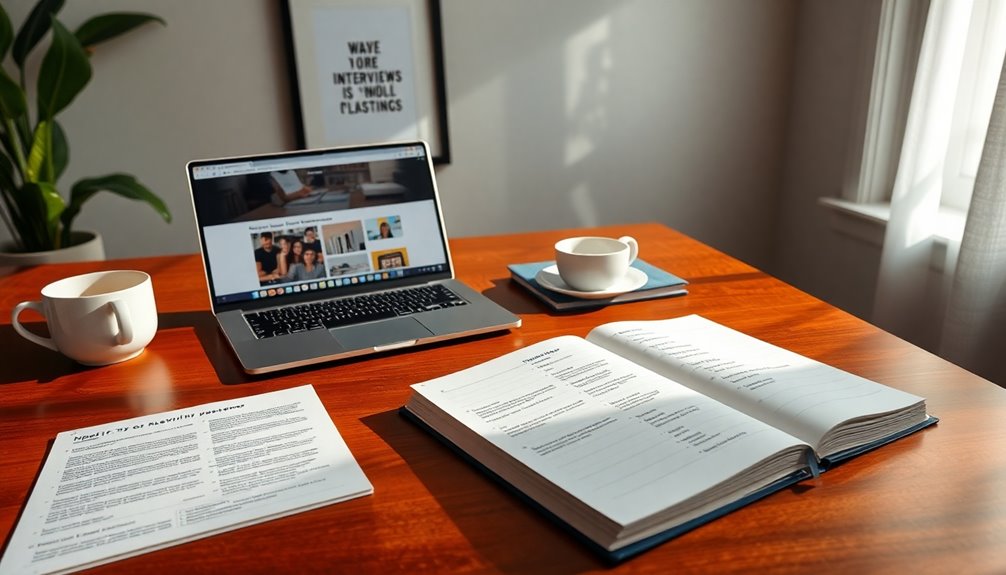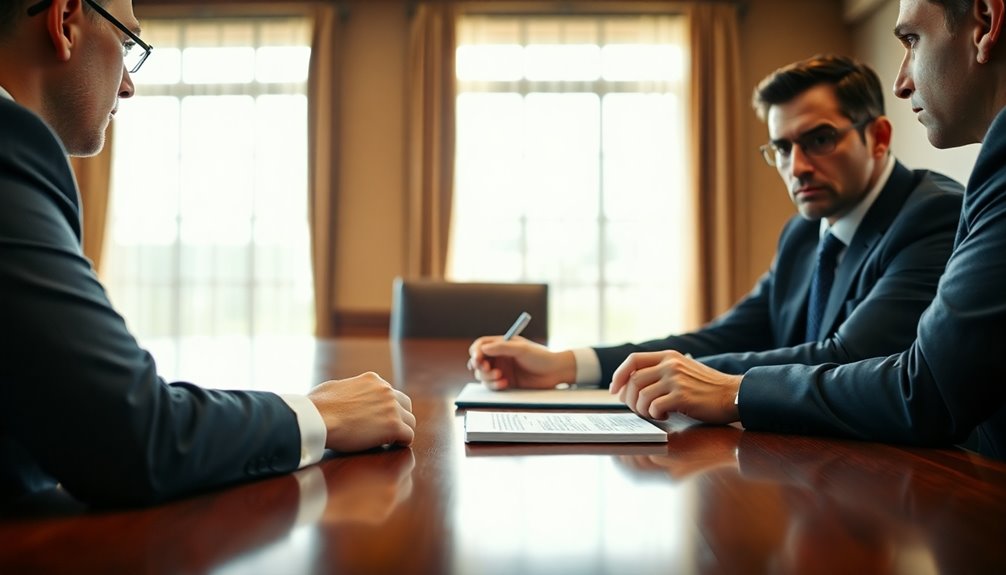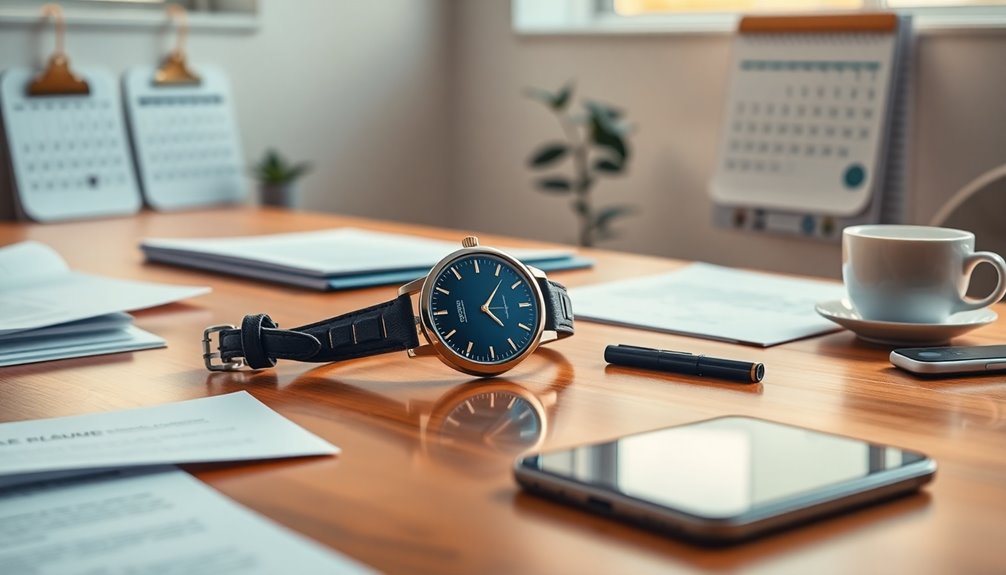To ace your job interview, avoid common pitfalls that can hinder your chances. Don't criticize former employers; instead, focus on positive experiences and what you learned. Be authentic—steer clear of clichés and share unique stories that showcase your skills. Prepare thoroughly by researching the company and tailoring your answers to fit their culture. Communicate effectively using industry terminology, maintain an open posture, and engage actively with the interviewer. Finally, dress professionally and express genuine enthusiasm. There's much more about crafting a successful interview strategy that can give you an edge.
Key Takeaways
- Avoid speaking negatively about past employers to maintain professionalism and credibility.
- Steer clear of clichés; instead, share unique experiences that highlight your skills and growth.
- Do thorough research on the company to tailor your responses and ask relevant questions.
- Practice active listening during the interview to foster engagement and rapport with the interviewer.
- Dress professionally and use positive body language to convey confidence and openness throughout the conversation.
Criticism and Professionalism

How do you talk about past employers during an interview?
It's essential to maintain professionalism when discussing your previous jobs. Avoid speaking poorly about former employers, as it can signal disloyalty and raise red flags for interviewers.
Instead, focus on the positive aspects of your experiences and what you learned. Frame your reason for leaving as a pursuit of growth opportunities that weren't available in your previous role. Recognizing the signs of narcissistic behavior in past workplaces can also help you articulate your experiences more effectively.
This approach not only highlights your ambition but also builds trust with the interviewer. Remember, professionalism in your tone and language reflects your credibility, so steer clear of casual language or slang.
Keeping your comments constructive will leave a lasting impression and enhance your chances of landing the job.
Authenticity and Originality

Authenticity and originality are essential in job interviews, as they help you stand out from the crowd. When you express your true self, interviewers are more likely to remember you.
Here are a few tips to enhance your authenticity:
- Avoid clichés; they can make you sound insincere.
- Share unique experiences that shaped your skills and character.
- Illustrate your problem-solving abilities with specific examples.
- Reflect on genuine learning moments instead of generic weaknesses.
- Be honest about your motivations and aspirations.
Preparation and Research

Thorough preparation and research can greatly enhance your chances of making a positive impression during a job interview. Knowing the company's values and culture helps you tailor your responses effectively. Dive deep into their recent projects and community involvement; it shows your genuine interest. Additionally, understanding retirement savings options can provide insight into the company's benefits and support for employee financial well-being.
| Preparation Tips | Research Areas | Sample Questions |
|---|---|---|
| Study the company website | Look at social media | What's the team culture like? |
| Read employee reviews | Check industry news | How does the company support growth? |
| Identify key initiatives | Explore company values | What's the biggest challenge right now? |
| Prepare specific examples | Understand competitors | How does the company prioritize innovation? |
Communication Skills

Effective communication skills are essential during a job interview, as they directly reflect your motivations and qualifications. You need to express your thoughts clearly and confidently while maintaining professionalism.
Remember, how you communicate can make or break the impression you leave. Here are some key points to keep in mind:
- Use industry-specific terminology appropriately to demonstrate knowledge.
- Practice active listening to show engagement and interest.
- Maintain an upright posture to convey attentiveness.
- Frame your responses constructively, avoiding negativity about past experiences.
- Ask thoughtful questions that encourage dialogue and reflect genuine interest.
- Demonstrating strong communication skills enhances clarity and builds rapport with interviewers.
Enthusiasm and Positive Attitude

When it comes to job interviews, demonstrating enthusiasm and a positive attitude can set you apart from other candidates. Showing genuine passion for the role not only engages interviewers but also highlights your commitment.
Keep a positive outlook throughout the process; express excitement about potential opportunities rather than frustrations about job searching. Your body language matters too—maintain eye contact, smile naturally, and lean in slightly to convey interest.
Reference specific aspects of the company that inspire you, such as their values or projects, to amplify your fervor. Remember, a lack of enthusiasm can be interpreted as disinterest, so be sure to showcase your keenness and readiness to contribute to the team.
Questions and Engagement

Engaging in a job interview goes beyond just showcasing your skills and enthusiasm; it also involves asking the right questions.
When you inquire thoughtfully, it reflects your genuine interest in the role and the company.
Here are some effective questions to contemplate:
- What does success look like in this position?
- How would you describe the company culture?
- Can you share more about the team I'd be working with?
- What're the biggest challenges currently facing the department?
- How does the company support professional development?
Personal Boundaries

Maintaining personal boundaries during a job interview is essential for projecting professionalism and ensuring the conversation remains focused on your qualifications.
Oversharing personal information can distract from your skills and experiences, so keep anecdotes concise and relevant. Avoid delving into sensitive or controversial topics that could create discomfort.
Instead, steer the discussion towards your career journey and achievements that align with the role. When asked about your interests, choose topics that reflect positively on your professional demeanor.
Always remember, the goal is to showcase your fit for the position without revealing too much personal detail. By respecting your own boundaries, you create an atmosphere of professionalism that benefits both you and the interviewer.
Body Language and Presentation

Personal boundaries set the stage for professional interactions, and body language plays a pivotal role in how you communicate your qualifications. Your nonverbal cues can greatly impact the interviewer's perception of you.
To make a positive impression, keep these body language tips in mind:
- Dress professionally to convey seriousness and respect.
- Maintain an upright posture to show confidence and engagement.
- Lean in slightly to express interest in the conversation.
- Smile naturally to create a warm and approachable atmosphere.
- Avoid closed-off gestures, like crossing your arms, to appear open and receptive.
Frequently Asked Questions
How Should I Answer Questions About My Weaknesses in an Interview?
When answering questions about your weaknesses in an interview, focus on presenting a genuine weakness and how you're actively working to improve it.
Share a specific example that illustrates your learning process, but don't dwell on it. Emphasize your growth and the steps you're taking to overcome this challenge.
This approach shows self-awareness and a commitment to personal development, which can resonate positively with interviewers.
What Should I Wear to a Job Interview?
When deciding what to wear to a job interview, aim for professional attire that aligns with the company culture. A tailored suit or smart dress can make a strong impression.
Don't forget to focus on grooming; clean, polished shoes and neat hair are essential.
Choose colors that convey confidence, like navy or gray, and avoid overly casual items.
Ultimately, wear something that makes you feel comfortable and confident, as it'll help you showcase your best self.
How Do I Follow up After an Interview?
Following up after an interview is like sending a thank-you note after a lovely dinner; it shows you appreciate the opportunity.
Send a brief email within 24-48 hours, expressing gratitude for the interview and reiterating your enthusiasm for the role. You can mention a specific conversation point to personalize it further.
Keep it professional and concise, and don't hesitate to ask about the next steps in the hiring process.
How Can I Handle Unexpected Interview Questions?
When you face unexpected interview questions, stay calm and take a moment to think.
It's okay to pause before answering. If you're unsure, ask for clarification.
Relate your response to your experiences or skills, showcasing your adaptability.
Practice active listening to fully understand the question.
Remember, interviewers appreciate authenticity, so don't hesitate to share your thought process.
This approach demonstrates your problem-solving abilities and keeps the conversation engaging.
What Is the Best Way to Research a Company Before an Interview?
Before your interview, dive deep into the company's website and social media profiles.
For instance, if you're interviewing at Tech Innovations, explore their recent projects and values. Check news articles for updates or achievements to understand their market position.
Also, review employee testimonials on platforms like Glassdoor to gauge company culture.
This preparation not only boosts your confidence but also allows you to ask insightful questions, showing your genuine interest in the organization.
Conclusion
Steering through a job interview is like walking a tightrope; one misstep can send you tumbling. By sidestepping common pitfalls—like negativity or lack of preparation—you'll stand tall and shine brightly. Embrace authenticity, engage with enthusiasm, and let your unique voice resonate. Remember, each interaction is a chance to weave a narrative that highlights your strengths. With mindful communication and a confident demeanor, you can transform the interview experience into a memorable journey toward your next opportunity.
Eugene brings a fresh, dynamic voice to our platform as one of our talented Writers. Specializing in research-driven content, he explores the latest findings in psychology and personal growth, translating them into actionable insights for our readers. Eugene’s work is fueled by a curiosity about what makes us tick and a desire to help others unlock their potential.










